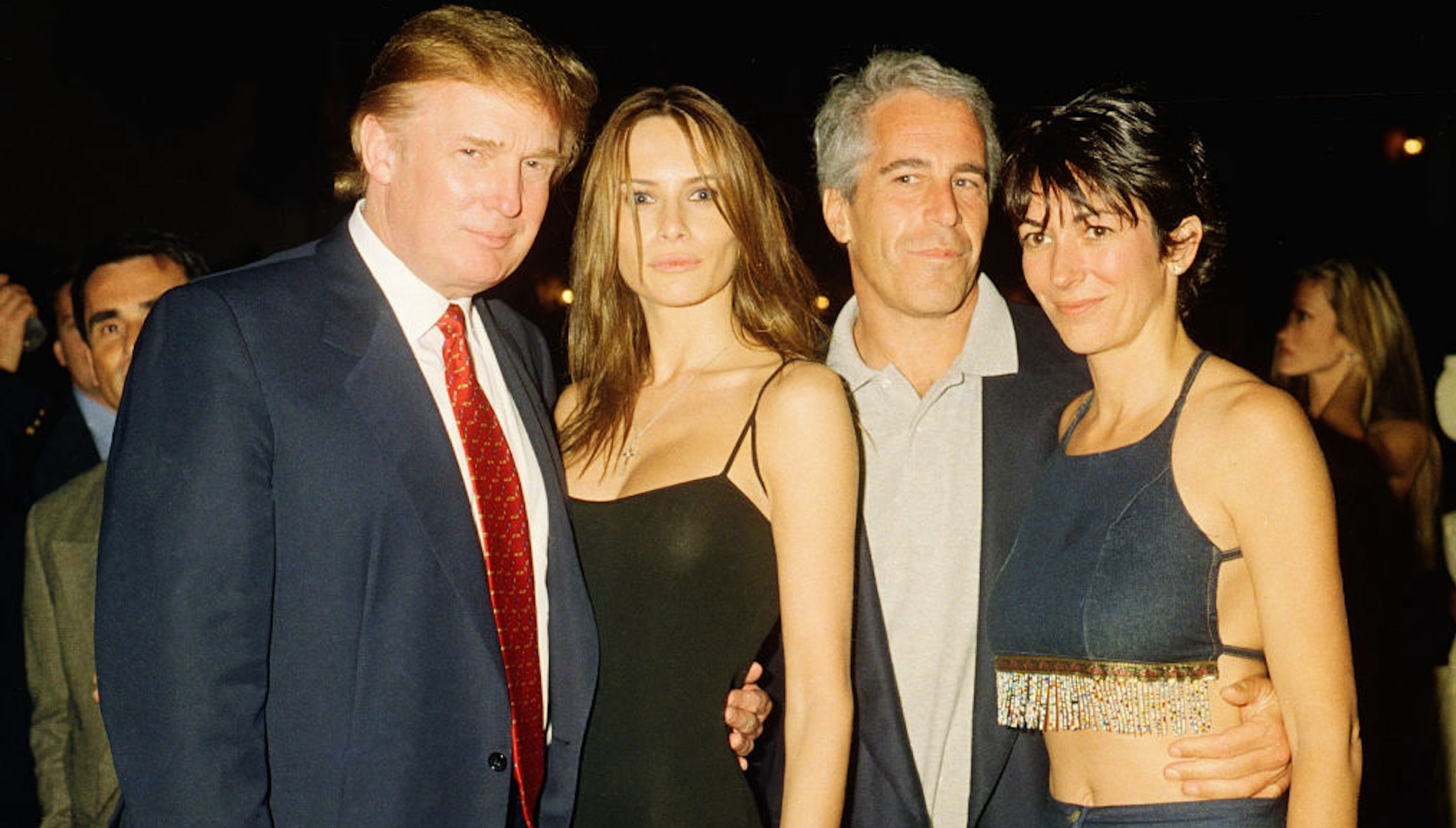Welcome to Margin of Error, a politics column from Tom Scocca, editor of the Indignity newsletter.
Donald Trump was good friends with the notorious sex trafficker Jeffrey Epstein for many years, the New York Times reported over the weekend, a friendship that included Trump hosting Epstein at "raucous parties with cheerleaders and models." The Times wrote that one "woman has said that Mr. Trump groped her when Mr. Epstein brought her to Trump Tower in Manhattan to meet him." Also: "Another accuser recalled being eyed by Mr. Trump during a brief encounter in Mr. Epstein’s office, and claimed that Mr. Epstein had told Mr. Trump at the time that 'she’s not for you.'"
Furthermore, the Times wrote:
In 1992, an NBC News camera captured the pair at a Mar-a-Lago party that featured cheerleaders from the Buffalo Bills, who were in town that weekend for a game against the Miami Dolphins. At one point in the footage, Mr. Trump can be seen dancing amid a crowd of young women. Later, he appears to be pointing at other women while whispering something in Mr. Epstein’s ear, causing him to double over with laughter.
Months later, when Mr. Trump hosted a party at Mar-a-Lago for young women in a so-called calendar girl competition, Mr. Epstein was the only other guest, according to George Houraney, a Florida-based businessman who arranged the event. Mr. Houraney recalled being surprised that Mr. Epstein was the only other person on the guest list.
Attentive readers may notice that each of those anecdotes from the big news story contains at least one underlined word or phrase, marking a hyperlink to an already existing new story. The URLs on those hyperlinks contain keywords and dates like "2019/07/09/us/politics/trump-epstein.html."
It is not news—in the traditional sense that "news" means the reporting of facts or events previously unknown to the public—that Trump, a legally confirmed sexual abuser who bragged on tape about forcing himself on women, was deeply connected with the convicted sexual predator Epstein. Their shared interests and activities were reported at the time and afterwards, after Trump entered presidential politics and as Epstein was indicted on a new round of charges; Trump's original first-term Secretary of Labor, Alex Acosta, was forced to resign because he had been the prosecutor who protected Epstein from federal charges in 2008 in a shockingly lenient plea deal. Yet those old facts are current news.
The previous weekend, the Times had published a sweeping magazine story about the military and political course of Israel's obliteration of Gaza, making the case that the Israeli prime minister, Benjamin Netanyahu, "made a series of decisions that prolonged a cataclysmic war in part to keep himself in power." The three reporters on the story, the Times noted, "spoke with more than 110 officials in Israel, the United States, and the Arab world and reviewed scores of documents, including meeting minutes, war plans, and court records." From that pile of evidence, they formed their judgments:
Our reporting has led us to three unavoidable conclusions. In the years preceding the war, Netanyahu’s approach to Hamas helped to strengthen the group, giving it space to secretly prepare for war. In the months before that war, Netanyahu’s push to undermine Israel’s judiciary widened already-deep rifts within Israeli society and weakened its military, making Israel appear vulnerable and encouraging Hamas to ready its attack. And once the war began, Netanyahu’s decisions were at times colored predominantly by political and personal need instead of only military or national necessity.
Again, there were the hyperlinks: "2023/12/10"..."2024/10/12." This story was full of fresh, horrifying detail about the depths of Netanyahu's blood-soaked cynicism, but the foundation of the argument was long-established facts: Netanyahu propped up Hamas to try to keep Palestinian government divided; Israel's government had the Hamas attack plan a year in advance and ignored it; Netanyahu's ability to hold on to his office, and to try to use his powers to thwart his ongoing corruption trial, depends on keeping his racist, militantly anti-Palestinian coalition partners happy.
Everyone knows or has had the opportunity to know these things. And still, they were put forward as revelations, as weighty and controversial claims that required extraordinary support.
The longer these cycles go on, the more and more it seems to me that George Santayana gravely underestimated the problem: it's not merely the past but the present that keeps repeating itself when nobody can remember it. "Remember" isn't even quite the right concept; what this century seems to have lost is the ability to identify things for what they are.
Donald Trump depends, in every way, on this eternally renewed collective blankness. The Trump administration attacks leading universities in the name of combating antisemitism. The news relays the charges. Meanwhile—before, during, and after—Trump is personally, as a matter of record, several different varieties of antisemite at once: the kind who uses "Shylocks" as a slur and believes as a basic conversational fact that Jews are conniving "brutal killers" in business; the kind who maintains that American Jews are really just overseas Israelis whose first loyalty is to the State of Israel; the kind who declares that any liberal Jewish voter "hates their religion"; the kind who welcomes the support of actual Nazis and hires them to work for his administration, and whose underlings speak up for the neo-Nazi party in German politics.
Amnesia and impunity feed off one another. Trump can't be an insurrectionist, because that would have made him ineligible for the presidency, and he won the presidential nomination, so January 6 can't have really been a coup attempt, so the January 6 attackers and conspirators all got pardoned and their cases dismissed. What would that all add up to if January 6 had been real? What's the point of holding on to the facts if the facts don't make a difference?
Last week, the Supreme Court, in one of its growing pile of unexplained majority orders, signed off on the Trump administration's argument that it should be allowed to proceed with mass firings across the Department of Education while the lawsuits against those firings proceed. It was true, without dispute, as the three dissenting justices noted, that Trump ran for president on a platform pledging to "close the Department of Education"; and that his Secretary of Education, Linda McMahon, took office declaring that the department was on its "final mission"; and that Trump issued an executive order directing McMahon to "take all necessary steps to facilitate the closure of the Department of Education"; and that shutting down the department would be illegal without an act of Congress repealing the law that established it. But the administration claimed that McMahon's firings of half the department's workforce were simply part of an effort to make it operate more efficiently, and six justices—three of them appointed by Trump—accepted that claim as plausible enough to forbid lower courts from blocking the firings.
Also last week, Trump conceded he had "talked about the concept of firing" Jerome Powell as chair of the Federal Reserve—which would be illegal—and told reporters, "He's a terrible, he's a terrible Fed chair. I'm surprised he was appointed. I was surprised frankly that Biden put him in and extended him." Trump appointed Powell himself, a little less than seven years ago.
Did Trump know he was lying? Another basic, well-established fact about the president is that he is decrepit, confused, and ailing. He has repeatedly appeared to doze off in public, including during his own criminal trial. The White House claimed this week that his swollen ankles are the result of chronic venous insufficiency, which happens to be one of the most benign possible reasons that a 79-year-old might be retaining fluid in the lower legs. Has Donald Trump ever presented a less than fully factual medical report? Who can say?
I'm not sure why I type these things unless I believe, somehow, that helping people to know things could make a difference, despite all the evidence so far to the contrary and even if the things were already there to be known. Legacy mass media are caught in the same crisis on a much larger scale, and their faith wavers—between treating the president as a president, or the Gaza slaughter as a clash between a regular military and an irregular one, and trying to deliver the truth in a package that will somehow stick.
The relationship between Trump and Epstein became worth covering again not because the Times had any particular scoop about it—nor even because the Wall Street Journal had delivered a genuine scoop about it, though it had—but because Trump had cultivated Epstein conspiracists for years as part of his political movement, only to tell them this month that Epstein had died by suicide in his jail cell and had left no secret client list. Of all the reversals and betrayals Trump had inflicted on his own base, this was the one that seemed as if it might, possibly, in some way, call for a reckoning.
Factually, Trump was always a strange champion for the Epstein movement to have chosen, given that he was president and in charge of the federal correctional system when Epstein died. But the fantasy that Trump would unravel a secret liberal child-abuse cabal and destroy their shared enemies seemed more powerful than the facts. And then the fantasy was ripped open, and it turned out the facts were still there, for anyone who might want them.






